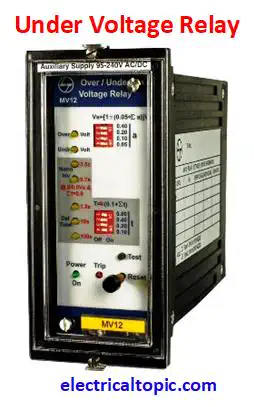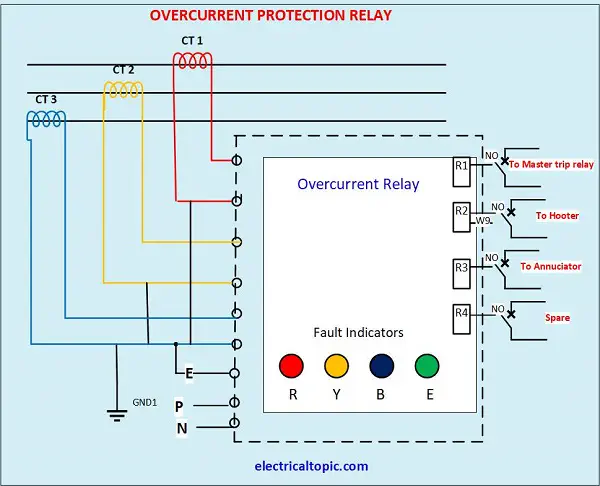Under Voltage Relay
Working principle, Connection diagram and Parameters
1 - Under voltage relay:

Under voltage relay is an electrical protection device which is used for prevention of decreasing system
voltage and operated after crossing pre set value of voltage and time then a tripping signal is provided to
the circuit breaker tripping coil. It is used in transformer outgoing isolation panel or LT panel or
feeder panel for controlling over voltage.
Under voltage relay continue monitors the default voltage
level
of system. If the voltage level is exceed pre set voltage limit then system will be tripped.
2 - What is the use for?
Under voltage condition is very dangerous in system voltage. Due to under voltage the system will start to
take more current as per ratings so resultant due to flowing more current then insulation which is used
on wire, cable, windings, may be failure, burn or heat. It means under voltage is very dangerous for equipment
health. So under voltage relay is used.
For exp: Default system voltage is 415V and -5% voltage variation is tolerated. If above 5% voltage can be
dangerous for system. So it is the important reason for using under voltage relay.
3 - Connection diagram of Under voltage relay.

4 - Working principle of Under voltage relay.
Under voltage preset value of - 5% multiply of system voltage and time 0.1 to 1.6 second can be adjusted as
per requirement. If the voltage is
decreased pre set value and time limit then under voltage relay, a tripping signal is provided to the circuit
breaker to tripping coil resultant tripping coil pushes to the trip mechanical latch. After tripping
condition, the Over
voltage relay provides us alarm, red indication on display screen and reset push button comes out side.
Again for normal
operation of UVR, we will have to press the reset push button so that system could be work normally. It is
microprocessor based relay and it is so important for prevention of under voltage.
5 - Relay setting parameters:
| Sr.No. | Parameters | Setting range |
|---|---|---|
| 1 | Voltage | : 110V, 220V or 415V |
| 2 | frequency | : 50, +/- 2.5 % |
| 3 | Auxiliary supply |
: 24V to 110V AC/DC or 95V to 240V AC/DC |
| 4 | Over Voltage relay setting | : 95% to 20% of system voltage (in steps of 5%) |
| 5 | Time | : 0.1 to 1.6 in steps of 0.1 |
| 6 | Pickup Current | : Same as set current |
| 7 | Reset Voltage | : 105% to 110% of set voltage. |
| 8 | Reset time | : 0.1- 10Sec in steps of 0.1Sec or Less than 50ms |
| 9 | Output volt for breaker trip coil. | : 240 volt AC or 30V DC |
| 10 | Indication LED. | :1- Supply on, 2- Under voltage, 3- Blink LED after crossing limit. |
| 11 | Output relay contact. | :1- for Alarm, 2- for tripping coil. |